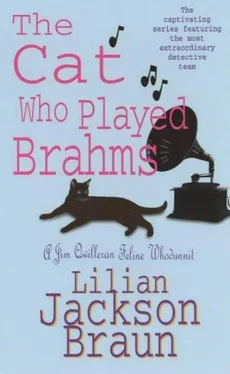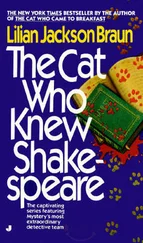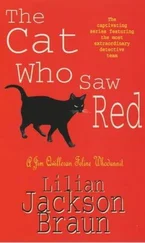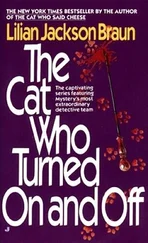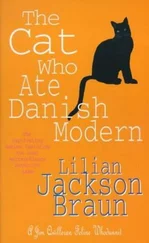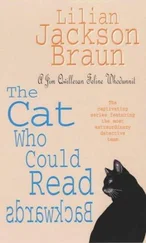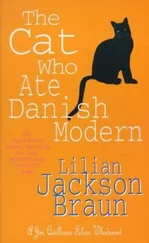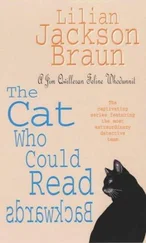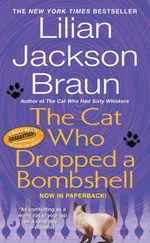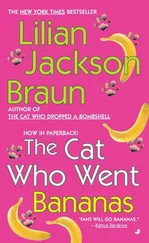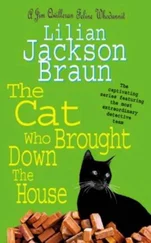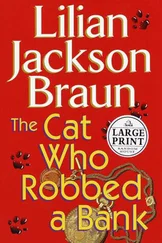Lilian Braun - The Cat Who Played Brahms
Здесь есть возможность читать онлайн «Lilian Braun - The Cat Who Played Brahms» весь текст электронной книги совершенно бесплатно (целиком полную версию без сокращений). В некоторых случаях можно слушать аудио, скачать через торрент в формате fb2 и присутствует краткое содержание. Жанр: Классический детектив, на английском языке. Описание произведения, (предисловие) а так же отзывы посетителей доступны на портале библиотеки ЛибКат.
- Название:The Cat Who Played Brahms
- Автор:
- Жанр:
- Год:неизвестен
- ISBN:нет данных
- Рейтинг книги:3 / 5. Голосов: 1
-
Избранное:Добавить в избранное
- Отзывы:
-
Ваша оценка:
- 60
- 1
- 2
- 3
- 4
- 5
The Cat Who Played Brahms: краткое содержание, описание и аннотация
Предлагаем к чтению аннотацию, описание, краткое содержание или предисловие (зависит от того, что написал сам автор книги «The Cat Who Played Brahms»). Если вы не нашли необходимую информацию о книге — напишите в комментариях, мы постараемся отыскать её.
The Cat Who Played Brahms — читать онлайн бесплатно полную книгу (весь текст) целиком
Ниже представлен текст книги, разбитый по страницам. Система сохранения места последней прочитанной страницы, позволяет с удобством читать онлайн бесплатно книгу «The Cat Who Played Brahms», без необходимости каждый раз заново искать на чём Вы остановились. Поставьте закладку, и сможете в любой момент перейти на страницу, на которой закончили чтение.
Интервал:
Закладка:
She knows something, Qwilleran thought, but the Legal Curtain has descended. "Wasn't Dunfield the police chief who was feuding with Fanny a few years ago? What was the trouble?" The attorney looked up at the ceiling before answering cooly. "Simply small-town politics. It goes on all the time." Qwilleran liked her style. He enjoyed his half hour in the company of an intelligent young woman with dimples and chic. Rosemary was attractive and comfortable to be with, but he had to admit he was captivated by career women in their thirties. Fondly he remembered Zoe the artist, Cokey the interior designer, and Mary the antiques dealer.
On his way back to the stone house he spotted another Goodwinter face. "Dr. Melinda, what are you doing here?" he said. "You're supposed to be repairing tourists at the Mooseville Limp-in Clinic." "My day off. Buy you a cup of coffee?" She guided him around the corner to a luncheonette. "Second worst coffee in the county," she warned him, "but everybody comes here." He tested the coffee. "Who's in first place? They'd have to try hard to beat this." "The Dimsdale Diner takes top honors," Melinda said with a flourish. "They have the worst coffee in the county and the worst hamburgers in northeast central United States.
You should try it. It's an old boxcar on the main highway, corner of Ittibittiwassee Road." "You're not going to make me believe Ittibittiwassee." "No joke. It's the road to the Ittibittiwassee River. The Indians had a village there at one time. Now it's time-sharing condos." "Tell me something, Melinda. I've seen the remains of the Dimsdale Mine and the Goodwinter Mine. Where's the Klingenschoen Mine?" Melinda studied his eyes to see if he could possibly be serious. Finally she said: "There is no Klingenschoen Mine. There never was a Klingenschoen Mine." "How did Fanny's grandfather make his money? In lumbering?" She looked amused. "No. He was a saloonkeeper." Qwilleran paused to digest the information. "He must have been highly successful." "Yes, but not highly respected. The K Saloon was notorious for half a century before World War I. Fanny's grandfather built the most luxurious house in town, but the Klingenschoens were never accepted socially. In fact, they were ridiculed. The miners had a marching song that went like this: We mine the mines and the K mines us, but who mines Minnie when the something something something. I don't know the punch line, and I'm not sure I want to know." "Then Minnie K was…" "Fanny's grandmother, a very friendly lady, according to the stories. You can read about it in the local history section of the public library. Fanny's father inherited the saloon but went bankrupt during Prohibition. Fortunately Fanny had her grandfather's talent for making money, and when she came back here at the age of sixty-five, she could buy and sell anyone in the county." As Qwilleran returned to the stone house he walked with a springier step. There was nothing like a juicy morsel of news to buoy his spirit, even when he was not on assignment.
Rosemary was equally exhilarated when he picked her' up for the ride home. She had had a lovely visit. The house was lovely-full of antiques. Francesca had given her a Staffordshire pitcher from her collection, and Rosemary thought it was lovely, Qwilleran thought it was ugly.
He said: "I've been hungry ever since lunch, and we ought to have an early dinner because Nick and Lori are coming at seven. Let's try the Old Stone Mill." The restaurant was an authentic old mill with a water wheel, and the atmosphere was picturesque, but the menu was ordinary — from the chicken noodle soup to the rice pudding.
"All I want is a salad," Rosemary said.
"I'm going to order the mediocre pork chops, a soggy baked potato, and overcooked green beans," Qwilleran said. "That's the Moose County specialty. Why don't you have the chicken julienne salad? It's probably tired lettuce and imitation tomatoes with concrete croutons and slivers of invisible chicken. No doubt they serve it with bottled dressing from Kansas City and a dusting of grated Parmesan that tastes like sawdust. This used to be a sawmill, you know." "Oh, Qwill! You're terrible," Rosemary admonished.
"What did you two emancipated females talk about while I was taking my walk?" "You. Aunt Fanny thinks you are so talented, so sincere, so kind, so sensitive. She even likes your orange cap. She says it makes you look dashing." "Did you tell her about the missing pickax?" "Yes. She said the Historical Society wanted it for their museum, so she had Tom pick it up." "She might have let me know. And what about the divers?" "They wrote to a real estate firm in Mooseville, asking for a summer house to rent.
They turned out to be very undesirable tenants. Especially the girls who spent the summer with them. She called them a name that I wouldn't repeat." "Aw, c'mon. Tell me." "No." "Spell it." "No, I won't. You're just teasing me." Qwilleran chuckled. He liked to tease Rosemary. She was the epitome of the Perfect Lady circa 1902.
She said: "I have a lot more to tell you, but I don't want to talk here." When they resumed their drive north he said: "Okay, let's have it. You and Fanny seemed to hit it off pretty well." "She thinks you and I are engaged, and I didn't dispute it because I wanted her to talk. It was really flattering, the way she took me into her confidence." "Good girl! What did she confide?" "Her method of getting what she wants. She manipulates people with big promises and little threats. She says everybody wants something or is hiding something. The trick is to find their weakness. I think she makes it a kind of hobby." "The little old rascal! That's the carrot-and-stick technique." "Of course, it works better if you have a lot of money." "Of course. What doesn't?" "She showed me a little gold pistol that she carries. That's to intimidate people. It's just a joke." "She has a quaint sense of humor. What did she say about Dunfield's murder?" "Oh my! She really hated that man. She got so mad I thought she was going to have a stroke." "Buck was the only one she couldn't manipulate." Rosemary giggled. "He accused her of growing marijuana In her backyard. Can you imagine that?" "Yes, I can."."About his murder, she said that people who play with fire can expect to get burned, and then she used some very bad language. I was shocked." Qwilleran smiled into his moustache. He reminded himself that Rosemary shocked easily.
"Such a nice little old lady," Rosemary went on. "Where did she pick up such a vocabulary?" "In New Jersey, probably." There was more to relate: about the library with four thousand leather-bound books, unread; the four closets filled with Aunt Fanny's spectacular wardrobe; the Staffordshire collection in the breakfast room, the envy of three major museums; the Georgian silver in the dining room…
"Stop!" Rosemary cried as they approached the turkey farm. "I'll run in and see if they have a dressed turkey. Then I can cook it for you before I leave." Qwilleran pulled into the farmyard alongside the inevitable blue pickup. "Make it snappy. It's getting close to seven o'clock." Alongside the row of poultry coops there was a metal shed with a sign on the door: Retail and Wholesale. Someone was moving about inside.
Rosemary ran into the building and in two minutes flat she was out again, carrying a bulbous object in a plastic sack. She looked green. She tossed the bundle into the back seat. "Get me out of here before I throw up! The odor was incredible!" "No one said a turkey farm is supposed to smell like a rose garden," Qwilleran said.
"You don't need to tell me about barnyards," she said indignantly. "I grew up on a farm. This was something different." She was unusually quiet until they reached the parking lot of the cabin. "I want to change clothes before they come," she said. "I feel like wearing something red." Qwilleran handed her the key. "You go in and start changing. I'll bring the bird. I hope it'll fit in the refrigerator." She hurried toward the cabin and stepped onto the porch. A moment later she screamed. "Rosemary! What is it?" Qwilleran shouted, running after her.
Читать дальшеИнтервал:
Закладка:
Похожие книги на «The Cat Who Played Brahms»
Представляем Вашему вниманию похожие книги на «The Cat Who Played Brahms» списком для выбора. Мы отобрали схожую по названию и смыслу литературу в надежде предоставить читателям больше вариантов отыскать новые, интересные, ещё непрочитанные произведения.
Обсуждение, отзывы о книге «The Cat Who Played Brahms» и просто собственные мнения читателей. Оставьте ваши комментарии, напишите, что Вы думаете о произведении, его смысле или главных героях. Укажите что конкретно понравилось, а что нет, и почему Вы так считаете.
